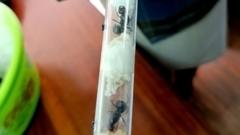The Kenya Wildlife Service has captured four suspects in an unprecedented case involving the smuggling of prized ants, revealing a troubling shift in wildlife trafficking trends toward lesser-known species.
Landmark Case in Kenya: Ant Smugglers Apprehended with Rare Insects

Landmark Case in Kenya: Ant Smugglers Apprehended with Rare Insects
Four individuals guilty of attempting to smuggle hundreds of rare ants, marking a significant act of bio-piracy.
The Kenya Wildlife Service (KWS) has reported a groundbreaking case involving the smuggling of hundreds of rare ants, leading to the arrest of four individuals who pleaded guilty to the charges. With the KWS typically focused on larger animals like lions and elephants, this incident marks a significant development in wildlife trafficking, indicating a worrying trend toward the illegal trade of vital insect species.
The contraband included the giant African harvester ant, Messor cephalotes, valued highly in the exotic pet trade, especially in Europe and Asia, where they can fetch up to £170 ($220) per specimen. KWS officials expressed concern over this "disturbing shift," as it indicates increasing demand for lesser-known species that play critical roles in ecological systems.
The suspects, two Belgians, a Vietnamese, and a Kenyan, were captured following an "intelligence-led operation." They concealed the ants within specially modified test tubes and syringes designed to keep the insects alive for up to two months. Photographs released by the KWS illustrate the extensive haul, where hundreds of tubes were packed with cotton wool and a few ants in each.
The case has revealed the lengths to which traffickers will go to evade detection, showcasing a calculated effort to circumvent security protocols by disguising the contents. The exact number of ants involved continues to be assessed, but the KWS confirmed this to be the largest case of "bio-piracy" in Kenya’s history.
KWS spokesperson Paul Udoto highlighted that this situation represents a growing trend in the illicit pet trade, where rare insect species are increasingly kept in formicariums by collectors. Insects like the giant African harvester ant are particularly sought after for their size and unique behaviors.
As Kenya tightly regulates the trade of these insects under international biodiversity treaties, this prosecution serves as a strong message of vigilance against unconventional wildlife crimes. The four suspects are slated for sentencing on Tuesday, setting a precedent for similar cases in the future.
The contraband included the giant African harvester ant, Messor cephalotes, valued highly in the exotic pet trade, especially in Europe and Asia, where they can fetch up to £170 ($220) per specimen. KWS officials expressed concern over this "disturbing shift," as it indicates increasing demand for lesser-known species that play critical roles in ecological systems.
The suspects, two Belgians, a Vietnamese, and a Kenyan, were captured following an "intelligence-led operation." They concealed the ants within specially modified test tubes and syringes designed to keep the insects alive for up to two months. Photographs released by the KWS illustrate the extensive haul, where hundreds of tubes were packed with cotton wool and a few ants in each.
The case has revealed the lengths to which traffickers will go to evade detection, showcasing a calculated effort to circumvent security protocols by disguising the contents. The exact number of ants involved continues to be assessed, but the KWS confirmed this to be the largest case of "bio-piracy" in Kenya’s history.
KWS spokesperson Paul Udoto highlighted that this situation represents a growing trend in the illicit pet trade, where rare insect species are increasingly kept in formicariums by collectors. Insects like the giant African harvester ant are particularly sought after for their size and unique behaviors.
As Kenya tightly regulates the trade of these insects under international biodiversity treaties, this prosecution serves as a strong message of vigilance against unconventional wildlife crimes. The four suspects are slated for sentencing on Tuesday, setting a precedent for similar cases in the future.




















